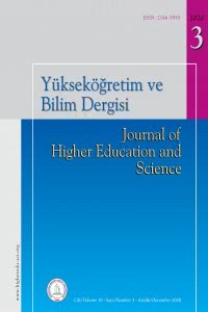Akademik Destek Programından Yararlanan Öğrencilerin Başarı Oranlarının Değerlendirilmesi
Öğrenci destek sistemleri, Akran desteği, Akran ilgisi, Aktif öğrenme
Success Rate Analysis of Academic Support Program Participants
Student support systems, Peer support, Peer involvement, Active learning,
___
- Arikan, H. (2002). The Role of Peer Support Program in Learning. In Proceedings of the 2nd International Conference on the Teaching of Mathematics. Crete, Greece, July 1-6 2002. (pp. 35-42).
- Arikan, H. (2007). A Leverage in learning. CBMS Issues in Mathematics Education, 14, 77-86.
- Arikan, H., Yilancioglu, K., & Sonusen, S. (2014). A Learning Leverage: Peer Instruction. Procedia-Social and Behavioral Sciences, 143, 45-51.
- Topping, K. J. (1996). The effectiveness of peer tutoring in further and higher education: A typology and review of the literature. Higher education, 32(3), 321-345.
- Vygotsky, L. S. (1978). Mind in society: The development of higher psychological procev
- ISSN: 2146-5959
- Yayın Aralığı: 3
- Başlangıç: 2011
- Yayıncı: Bülent Ecevit Üniversitesi (Önceden Zonguldak Karaelmas Üniversitesi)
Mirgül ENTERİEVA, FERUDUN SEZGİN
Ferudun SEZGİN, Mirgül ENTERİEVA
Bir Etki Aracı Olarak Türk Yükseköğretiminin 'Yumuşak Güç' Bağlamında İncelenmesi
Türkiye'de Meslek Yüksekokullarının 2000'li Yıllardaki Gelişimi ve Mevcut Zorluklar
Üniversite Mezuniyet Notları ve Dönüşüm Tablolarında Yaşanan Kaos
Avrupa Yükseköğrenim Alanında Kalite Güvencesi Standartları ve Yönergeleri
METİN TOPRAK, Deniz US, Mehmet ŞENGÜL
Astroloji Sözdebilimi ve Toplum için Yarattığı Tehditler Üzerine Bir Tartışma
Uzaktan Eğitimde E-Değerlendirme Üzerine Öğrenci Algıları
Akademik Destek Programından Yararlanan Öğrencilerin Başarı Oranlarının Değerlendirilmesi
Bir Etki Aracı Olarak Türk Yükseköğretiminin 'Yumuşak Güç' Bağlamında İncelenmesi
